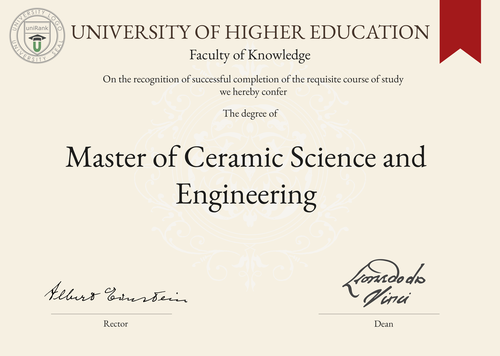
Master of Ceramic Science and Engineering (M.C.S.E.)
Guide to University Programs/Courses
Master of Ceramic Science and Engineering (M.C.S.E.)

Program/Course Name
Master of Ceramic Science and EngineeringProgram or Degree abbreviation:
M.C.S.E.Duration Range
Varies by country and university, typically 1-2 yearsTuition range:
Varies by country and university, typically $10,000-$30,000 per yearOverview
The Master of Ceramic Science and Engineering program is designed to provide students with advanced knowledge and skills in the field of ceramic materials. This program combines theoretical and practical training to prepare graduates for careers in industries such as manufacturing, research and development.Curriculum Overview by Year
The curriculum is structured to cover fundamental concepts in ceramic science and engineering, as well as specialized topics. In the first year, students typically study courses such as Ceramic Materials, Ceramic Processing and Ceramic Characterization. In the second year, they may choose elective courses based on their interests, such as Advanced Ceramic Manufacturing or Ceramic Coatings.Key Components
The key components of the Master of Ceramic Science and Engineering program include in-depth study of ceramic materials, hands-on laboratory work, research projects and industry internships. Students also gain knowledge in areas such as material characterization techniques, ceramic processing methods and quality control.Career Prospects
Graduates of this program can pursue various career paths in industries related to ceramics, such as aerospace, automotive, electronics and energy. They may work as ceramic engineers, materials scientists, research and development specialists, or production managers.Salary Expectations
Salary expectations for Master of Ceramic Science and Engineering graduates can vary depending on factors such as location, industry and level of experience. On average, professionals in this field can earn salaries ranging from $60,000 to $100,000 per year.Conclusions
It is important to note that the duration, tuition fees, curriculum, key components, career prospects and salary expectations of the Master of Ceramic Science and Engineering program can vary depending on the chosen country or location of study, as well as the chosen university. Prospective students are encouraged to research and compare different programs to find the best fit for their goals and aspirations. Visitors can search for where this specific degree, M.C.S.E., is offered anywhere in the world through the uniRank World Universities Search Engine.World Universities Search Engine
search for Master of Ceramic Science and Engineering (M.C.S.E.) and add the Location (country, state etc.) or specific University you are interested in studying at.
Query examples:
- Master of Ceramic Science and Engineering (M.C.S.E.) United States
- Master of Ceramic Science and Engineering (M.C.S.E.) United Kingdom online
- Master of Ceramic Science and Engineering (M.C.S.E.) Australia international students
- Master of Ceramic Science and Engineering (M.C.S.E.) University of California
- Master of Ceramic Science and Engineering (M.C.S.E.) University of London tuition fees
- Master of Ceramic Science and Engineering (M.C.S.E.) University of Sydney scholarships